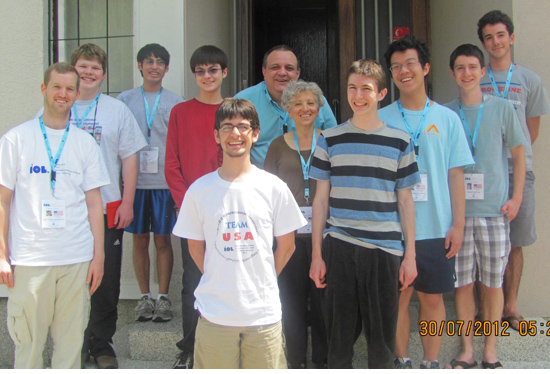Dragomir Radev Coaches High School Linguists to Multiple Wins in International Competition
The 10th International Linguistics Olympiad (IOL) was held in Ljubljana, Slovenia from July 29th to August 4th, 2012.

 Enlarge
Enlarge
Dragomir Radev, Professor in Computer Science and Engineering, the School of Information, and in the Department of Linguistics in LS&A, has led North American high school students to successful competition at the 10th International Linguistics Olympiad (IOL), which was held in Ljubljana, Slovenia, from July 29th to August 4th, 2012. It is the sixth year that Radev has coached the team.
The IOL, one of twelve international science olympiads, consists of two events. The first is the individual contest, a six-hour test, which this year had problems about the languages Dyirbal, Umbu-Ungu, Basque, Teop, and Rotuman. The second event is the team contest, which this year asked contestants to decipher a list of 57 countries written in Lao. To solve these problems, contestants applied knowledge about the way languages work as well as logic and reasoning skills to decipher unfamiliar languages and writing systems.
In the individual round, the USA won six medals and one honorable mention, and Canada won one honorable mention. Alexander Wade and Anderson Wang of USA won gold medals; Aaron Klein, Allan Sadun, and Darryl Wu of USA won silver medals; Erik Andersen of USA won a bronze medal; and Sam Zbarsky of USA and Harry Go of Canada won honorable mention awards. After the US, Russia and Bulgaria finished second and third in individual competition by counting gold medals first, then silver and bronze. They were followed by South Korea, Poland, the UK, and Estonia.
In the team contest, USA Blue – Erik Andersen, Aidan Kaplan, Aaron Klein, and Alexander Wade – won first place. They were followed by the Netherlands and Poland.
The IOL mimics the skills used by researchers and scholars in the field of computational linguistics, which is increasingly important for the United States and other countries. Using computational linguistics, experts can develop automated language technologies such as search engines and translation software that cut down on the time and training needed to work with other languages.
34 teams from 27 countries competed in the 2012 IOL, the most ever. US and Canadian team members were selected from more than 1,500 students who competed in the North American Computational Linguistics Olympiad (NACLO) last winter. Radev, along with Lori Levin, a professor at Carnegie Mellon University, coached the US team; Pat Littell, a doctoral student at the University of British Columbia, coached the Canadian team. Adam Hesterberg, an IOL veteran and Fulbright scholar in mathematics helped to prepare the North American teams for the IOL. Radev and Levin are founders of NACLO.
Connections:
NACLO press release (PDF): USA and Canada Triumph at the International Linguistics Olympiad
Wikipedia: International Linguistics Olympiad
Wikipedia: North American Computational Linguistics Olympiad
 MENU
MENU 
